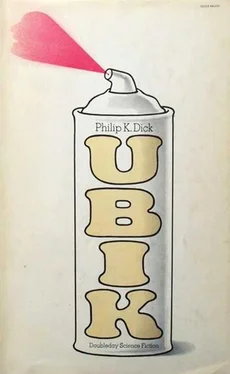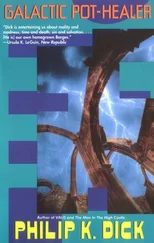“I’ll go to the other drugstore that has it,” Joe said. He leaned against a counter, painfully drawing in slow, irregular gulps of air.
Jory, from within the balding pharmacist, said, “It’ll be closed.”
“Tomorrow,” Joe said. “I can hold out until tomorrow morning.”
“You can’t,” Jory said. “And, anyhow, the Ubik at that drugstore will be regressed too.”
“Another town,” Joe said.
“Wherever you go, it’ll be regressed. Back to the salve or back to the powder or back to the elixir or back to the balm. You’ll never see a spray can of it, Joe Chip.” Jory, in the form of the bald-headed pharmacist, smiled, showing celluloid-like dentures.
“I can—” He broke off, gathering his meager vitality to him. Trying, by his own strength, to warm his stiffening, cold-numbed body. “Bring it up to the present,” he said. “To 1992.”
“Can you, Mr. Chip?” The pharmacist handed Joe a square pasteboard container. “Here you are. Open it and you’ll see—”
Joe said, “I know what I’ll see.” He concentrated on the blue jar of liver and kidney balm. Evolve forward, he said to it, flooding it with his need; he poured whatever energy he had left onto the container. It did not change. This is the regular world, he said to it. “Spray can,” he said aloud. He shut his eyes, resting.
“It’s not a spray can, Mr. Chip,” the pharmacist said. Going here and there in the drugstore he shut off lights; at the cash register he punched a key and the drawer rattled open. Expertly, the pharmacist transferred the bills and change from the drawer into a metal box with a lock on it.
“You are a spray can,” Joe said to the pasteboard container which he held in his hand. “This is 1992,” he said, and tried to exert everything; he put the entirety of himself into the effort.
The last light blinked out, turned off by the pseudo pharmacist. A dull gleam shone into the drugstore from the street-lamp outside; by it, Joe could make out the shape of the object in his hand, its boxlike lines. Opening the door, the pharmacist said, “Come on, Mr. Chip. Time to go home. She was wrong, wasn’t she? And you won’t see her again, because she’s so far on the road to being reborn; she’s not thinking about you any more, or me or Runciter. What Ella sees now are various lights: red and dingy, then maybe bright orange—”
“What I hold here,” Joe said, “is a spray can.”
“No,” the pharmacist said. “I’m sorry, Mr. Chip. I really am. But it’s not.”
Joe set the pasteboard container down on a nearby counter. He turned, with dignity, and began the long, slow journey across the drugstore to the front door which the pharmacist held open for him. Neither of them spoke until Joe, at last, passed through the doorway and out onto the nocturnal sidewalk.
Behind him the pharmacist emerged too; he bent and locked the door after the two of them.
“I think I’ll complain to the manufacturer,” Joe said. “About the—” He ceased talking. Something constricted his throat; he could not breathe and he could not speak. Then, temporarily, the blockage abated. “Your regressed drugstore,” he finished.
“Goodnight,” the pharmacist said. He remained for a moment, eying Joe in the evening gloom. Then, shrugging, he started off.
To his left, Joe made out the dark shape of a bench where people waited for a streetcar. He managed to reach it, to seat himself. The other persons, two or three, whichever it was, squeezed away from him, either out of aversion or to give him room; he could not tell which, and he didn’t care. All he felt was the support of the bench beneath him, the release of some of his vast inertial weight. A few more minutes, he said to himself. If I remember right. Christ, what a thing to have to go through, he said to himself. For the second time.
Anyhow, we tried, he thought as he watched the yellow fliekering lights and neon signs, the flow of cars going in both directions directly before his eyes. He thought to himself, Runciter kicked and struggled; Ella has been scratching and biting and gouging for a long time. And, he thought, I damn near evolved the jar of Ubik liver and kidney balm back to the present. I almost succeeded. There was something in knowing that, an awareness of his own great strength. His final transcendental attempt.
The streetcar, a clanging metal enormity, came to a grating halt before the bench. The several people beside Joe rose and hurried out to board it by its rear platform.
“Hey, mister!” the conductor yelled to Joe. “Are you coming or aren’t you?”
Joe said nothing. The conductor waited, then jerked his signal cord. Noisily, the streetcar started up; it continued on, and then at last disappeared beyond his range of vision. Lots of luck, Joe said to himself as he heard the racket of the streetcar’s wheels die away. And so long.
He leaned back, closed his eyes.
“Excuse me.” Bending over him in the darkness; a girl in a synthetic ostrich-leather coat. He looked up at her, jarred into awareness. “Mr. Chip?” she said. Pretty and slender, dressed in hat, gloves, suit and high heels. She held something in her hand; he saw the outline of a package. “Of New York? Of Runciter Associates ? I don’t want to give this to the wrong person.”
“I’m Joe Chip,” he said. For a moment he thought the girl might be Ella Runciter. But he had never seen her before. “Who sent you?” he said.
“Dr. Sonderbar,” the girl said. “The younger Dr. Sonderbar, son of Dr. Sonderbar the founder.”
“Who’s that?” The name meant nothing to him, and then he remembered where he had seen it. “The Liver and Kidney man,” he said. “Processed oleander leaves, oil of peppermint, charcoal, cobalt chloride, zinc oxide—” Weariness overcame him; he stopped talking.
The girl said, “By making use of the most advanced techniques of modern-day science, the reversion of matter to earlier forms can be reversed, and at a price any conapt owner can afford. Ubik is sold by leading home-art stores throughout Earth. So look for it at the place you shop, Mr. Chip.”
Fully conscious now, he said, “Look for it where?” He struggled to his feet, stood inexpertly swaying. “You’re from 1992; what you said came from Runciter’s TV commercial.”
An evening wind rustled at him and he felt it tug at him, drawing him away with it; he seemed to be like some ragged bundle of webs and cloth, barely holding together.
“Yes, Mr. Chip.” The girl handed him a package. “You brought me from the future, by what you did there inside the drugstore a few moments ago. You summoned me directly from the factory. Mr. Chip, I could spray it on you, if you’re too weak to. Shall I? I’m an official factory representative and technical consultant; I know how to apply it.” She took the package swiftly back from his trembling hands; tearing it open, she immediately sprayed him with Ubik. In the dusk he saw the spray can glint. He saw the happy, colored lettering.
“Thanks,” he said after a time. After he felt better. And warmer.
The girl said, “You didn’t need as much this time as you did in the hotel room; you must be stronger than before. Here, take the can of it; you might need it before morning.”
“Can I get more?” Joe said. “When this runs out?”
“Evidently so. If you got me here once. I would assume you can get me here again. The same way.” She moved away from him, merging with the shadows created by the dense walls of closed-up nearby stores.
“What is Ubik?” Joe said, wanting her to stay.
“A spray can of Ubik,” the girl answered, “is a portable negative ionizer, with a self-contained, high-voltage, low-amp unit powered by a peak-gain helium battery of 25kv. The negative ions are given a counter-clockwise spin by a radically biased acceleration chamber, which creates a centripetal tendency to them so that they cohere rather than dissipate. A negative ion field diminishes the velocity of anti-protophasons normally present in the atmosphere; as soon as their velocity falls they cease to be anti-protophasons and, under the principle of parity, no longer can unite with protophasons radiated from persons frozen in cold-pac; that is, those in half-life. The end result is that the proportion of protophasons not canceled by anti-protophasons increases, which means—for a specific time, anyhow—an increment in the net put-forth field of protophasonic activity… which the affected half-lifer experiences as greater vitality plus a lowering of the experience of low cold-pac temperatures. So you can see why regressed forms of Ubik failed to—”
Читать дальше








